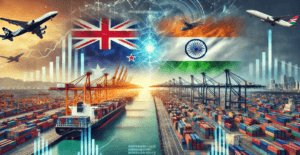Luxon’s Push for a New Zealand-India Trade Deal: Balancing Expectations and Opportunities
New Zealand Prime Minister Christopher Luxon is pushing for a free trade deal with India, prioritizing a “good” agreement over a “perfect” one. Talks previously stalled in 2015 due to dairy trade issues, but compromises may now be possible. New Zealand could follow Australia’s model by excluding dairy. Strengthening ties with India aligns with New Zealand’s Indo-Pacific strategy and concerns over China’s influence. Luxon’s speech at India’s Raisina Dialogue highlights security and trade cooperation. Current trade between both nations is NZ$3.14 billion, but there’s potential in tourism, space technology, renewable energy, and agritech.
India’s rising economic power and New Zealand’s appeal for Indian students add to the opportunities. Luxon also seeks a diplomatic win to boost his domestic political standing. The Indian community in New Zealand plays a vital role in economic ties. Despite progress, challenges remain due to India’s tough trade negotiations. Luxon’s leadership faces high expectations. The deal could reshape future relations between the two countries.

Luxon’s Push for a New Zealand-India Trade Deal: Balancing Expectations and Opportunities
New Zealand’s Prime Minister, Christopher Luxon, is optimistic about finalizing a free trade agreement with India during his first term in office. While some doubt whether this timeline is achievable, Luxon has emphasized that his priority is securing a “good” deal rather than waiting for a “perfect” one. This pragmatic approach reflects his understanding of the complexities involved in trade negotiations. Talks between New Zealand and India previously stalled in 2015 due to disagreements over dairy product inclusion. However, Luxon’s government appears willing to make compromises, possibly following Australia’s example, which excluded dairy from its trade agreement with India.
One of the key motivations behind New Zealand’s push to strengthen ties with India is its strategic position in the Indo-Pacific region. Additionally, growing concerns about China’s influence have made it even more crucial for New Zealand to build stronger relationships with other major players like India. Luxon underscored this during his speech at India’s Raisina Dialogue, where he highlighted the shared interests of both nations, particularly regarding security and stability in the Indo-Pacific.
Currently, trade between New Zealand and India remains modest, totaling NZ$3.14 billion in 2024. However, there is significant potential for growth. New Zealand primarily exports wool, steel, and fruits to India, while importing pharmaceuticals, textiles, and machinery. With India’s middle class expanding rapidly and New Zealand becoming an increasingly attractive destination for Indian students, economic ties are poised to deepen. Key sectors such as tourism, space technology, renewable energy, and agricultural technology (agritech) present promising opportunities for collaboration.
Luxon’s efforts to strengthen relations with India come at a time when India is emerging as a major global power. This adds strategic and economic significance to the partnership. However, he faces pressure to deliver tangible results, as both nations have high expectations for the future of their trade relationship. While challenges remain, Luxon’s pragmatic and forward-thinking approach suggests progress is possible, even if it requires compromises on certain issues.
In summary, Christopher Luxon is committed to securing a free trade deal with India during his tenure. By prioritizing a “good” deal over a “perfect” one, he demonstrates a realistic approach to negotiations. The previous impasse from 2015, particularly over dairy products, may no longer be a major obstacle, as New Zealand appears ready to make concessions. The broader Indo-Pacific context, including concerns over China’s influence, further underscores the need for stronger ties between New Zealand and India. While current trade volumes are relatively small, the potential for growth is substantial, particularly in sectors like tourism, technology, and renewable energy.
As India continues to rise as a global economic power, Luxon’s leadership will play a key role in shaping a promising future for trade relations between the two countries. However, the pressure remains on him to deliver results that meet the expectations of both nations.
You must be logged in to post a comment.